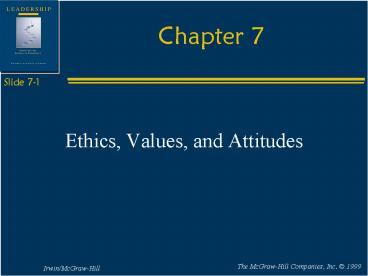Ethics, Values, and Attitudes - PowerPoint PPT Presentation
1 / 13
Title:
Ethics, Values, and Attitudes
Description:
The goal of this chapter is to explore how leadership leads to ethical ... Goals and Means of Achievement: Tough-Tender. Orientation to Authority: Equal-Unequal ... – PowerPoint PPT presentation
Number of Views:3451
Avg rating:3.0/5.0
Title: Ethics, Values, and Attitudes
1
Chapter 7
- Ethics, Values, and Attitudes
2
Chapter Goals
- The goal of this chapter is to explore how
leadership leads to ethical dilemmas where our
ethics, values, and attitudes are directly
involved.
3
Ethics
- Ethics are principles of right conduct or a
system of moral values.
4
Values
- Values are constructs representing generalized
behaviors or states of affairs that are
considered by the individual to be important.
(Gordon, 1975, p.2)
5
Developmental Stages
- Kohlberg theorized that people progress through a
series of developmental stages in their moral
reasoning - The Preconventional Stage
- The Conventional Stage
- The Postconventional Stage
6
Developmental Levels and Stages of Moral
Reasoning - Preconventional level
7
Developmental Levels and Stages of Moral
Reasoning - Conventional level
Cont.
8
Developmental Levels and Stages of Moral
Reasoning - Postconventional level
Cont.
9
Values can affect leaders in six different ways
- values affect leaders perceptions of situations
and the problems at hand. - values affect the solutions generated and the
decisions that are reached. - values influence how leaders perceive different
individuals and groups.
10
Values can affect leaders in six different ways
Cont.
- values influence leaders perceptions of
individual and organizational successes as well
as the manner in which these successes are to be
achieved. - values provide a basis for leaders to
differentiate between right and wrong, and
between ethical and unethical behavior. - values may affect the extent to which leaders
accept or reject organizational pressures and
goals.
11
Attitudes
- Attitudes have three components
- the ideational component concerns what the
attitude is about. - the affective component concerns the feelings one
has about those ideas. - the behavioral component concerns how people act
in certain ways.
12
Seven Fundamental Dilemmas that People of all
Cultures Face
- Source of Identity Individual-Collective
- Goals and Means of Achievement Tough-Tender
- Orientation to Authority Equal-Unequal
- Response to Ambiguity Dynamic-Stable
13
Seven Fundamental Dilemmas that People of all
Cultures Face
Cont.
- Means of Knowledge Acquisition Active-Reflective
- Perspective on Time Scarce-Plentiful
- Outlook on Life Doing-Being

